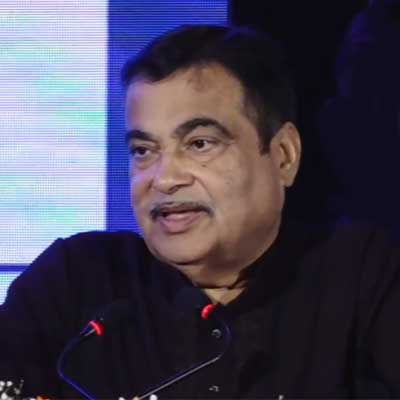As highway InvITs perform well and numerous digital and technology innovations push the infrastructure sector, Private sector participation in the PPP mode can push for fast-track growth of the Indian economy, says Nitin Gadkari, Minister of Road Transport and Highways in India.
The dream of the Prime Minister is to make the Indian economy $5 trillion. As the fastest growing economy in the world, the current target is to make India number 3 in world economy in the next five years.
For this Gadkari called out industry, trade, business and agriculture as the most important sectors which were contributing to the country’s progress. Good infrastructure is a key requirement. Without water, power and transport and communication it is impossible to get industry and capital investment, without which employment generation and eradication of poverty was not possible. The finance minister in the Budget speech allocated Rs 10 lakh crore only for infrastructure development. Highways and roadways budget is Rs 2.70 lakh crore. Gadkari exhorted the industry to come forward with more public private investments in infrastructure.
Gadkari gave the example of the 80 mld Mathura sewage treatment plant in hybrid mode proposed when he was water resources minister. To make it a public-private-partnership (PPP) project, the government put in 40 per cent and the remaining was to come from investors. Today the project is completed and Indian Oil pays Rs 20 crore per year to that project for the water processed from the sludge, making the project economically viable.
There was a lot of research on how to convert waste to wealth, Gadkari said. The minister called out the 30 lakh tonne of municipal garbage from the Ghazipur Hill which has been used in road building in Delhi. Another 30 lakh tonnes of garbage was used in the construction of the Ahmedabad Dholera express road. Large PPP investments in the roads sector, bridges, tunnels and highways, and in any large project would help bridge the infrastructure gaps.
Gadkari called for good technology and innovation as well as successful construction practices. Knowledge and conversion of knowledge into wealth is the future, he said. To reduce the cost of construction without compromising quality, he called for mandating precast technology in building construction and roads. This would bring down the on-site pollution. Tackling the challenge of changing waste into wealth to help protect the ecology and environment flyash and steel slag were available; used tyres can be used in bitumen; plastic waste is already being used in road-making and crash barriers have successfully been made of bamboo. Economic viability in use of materials available and its marketability is important, Gadkari said.
Efforts are being made to reduce the logistics cost in India which are presently 14-16%. In China it is 8-10 % and just 12 % in Europe and USA. Use of ethanol, methanol, bio-CNG, bio-diesel, biofuels and electric and hydrogen is on the cards. The Urban Road 2 - Delhi Jaipur electric cable highway and the Nagpur to Nashik e highway are steps in this direction. If buses and trucks use the e-highway, ticket charges can be reduced by upto 30% as compared to diesel vehicles and service quality improves too.
There are 260 projects of cable cars, ropeways and funicular railways in the pipeline. In a meeting with the chief minister of Karnataka, Gadkari had suggested sky buses with 250 capacity to solve pollution and traffic problems. One project of two 50 km tunnels with 3 lanes each at a cost of Rs 35,000 crore is already underway and PPP projects in the Build Own Operate (BOT) model is possible. People have to pay for quality services and they are ready to do that. He told the industry that it is the right time to invest in infrastructure BOT, Hybrid funds or in Infrastructure investment bonds. In the first Highways InvIT on the Bombay Stock Exchange, to be open for seven days, the bond was subscribed seven times over within just seven hours. Resources clearly is nor the problem. Gadkari offered strong political will, a corruption-free environment, fast-track decision making and transparency as solutions.
He called for honesty, credibility and quality to become the currency of the 21st century.
E Jayashree Kurup is Director, Wordmeister Editorial Services and Senior Editor, Construction World




















